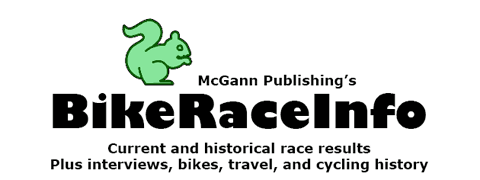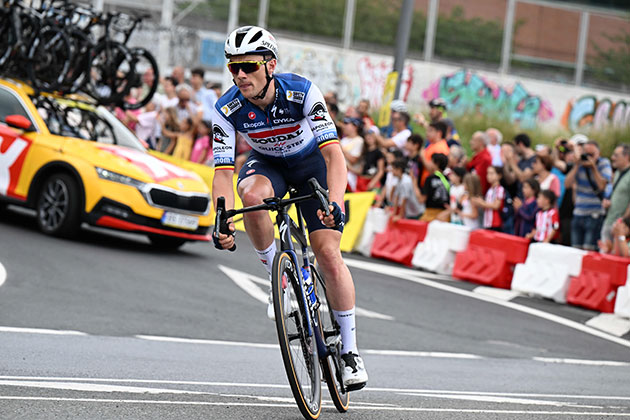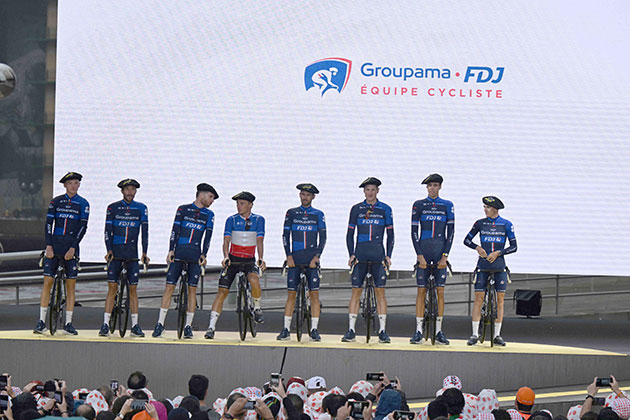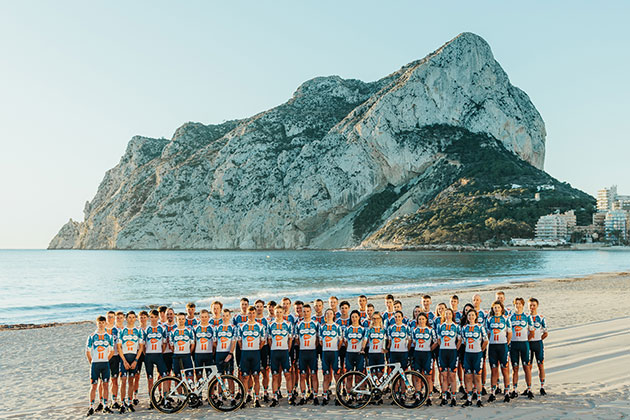

Bicycle Racing News and Opinion,
Wednesday, May 29, 2024
Back to news and opinion index page for links to archived stories | Commentary | Our YouTube page
2023 Tour de France | 2023 Giro d'Italia
To give aid to every poor man is far beyond the reach and power of every man. Care of the poor is incumbent on society as a whole. - Baruch Spinoza

Les Woodland's book Cycling’s 50 Craziest Stories is available in print, Kindle eBook & audiobook versions. To get your copy, just click on the Amazon link on the right.
Current racing:
- May 29: Circuit Franco-Belge
Upcoming racing:
- June 2: Brussels Cycling Classic
- June 2 - 9: Critérium du Dauphiné
- June 5 - 9: ZLM Tour
- June 7: GP Canton Aargau
- June 9 - 16: Tour de Suisse
- June 12 - 16: Baloise Belgium Tour
- June 15 - 18: La Route d'Occitanie Cancelled because security forces busy with Olympics
- June 21 - 26: Many National Championships
- July 1 - 23: Tour de France
Latest completed racing:
- May 4 - 26: Giro d'Italia
- May 23 - 26: Tour of Norway
- May 26: Rund um Köln
- May 14 - 19: 4 Days of Dunkirk
- May 18: Veenendaal - Veenendaal Classic
- May 11: Tour du Finistère
- May 5: Tro-Bro Léon
- May 4: GP du Morbihan
- May 1: Rund um den Finanzplatz Eschborn-Frankfurt
Here's the team's update:
Wednesday’s Circuit Franco-Belge, another race where our team triumphed on several occasions, will be Soudal Quick-Step’s final appointment of what has been a very successful month. Running between Tournai and Mont-de-l’Enclus, over a hilly 190.6 kilometers course comprising more than a dozen classified climbs, the race favours the attackers who will have plenty of opportunities to make the difference before the uphill finish coming just ten kilometers from the top of the last climb, Trieu-Knokteberg (1km, 7.9%).
Ayco Bastiaens, Gil Gelders, Antoine Huby, double Dwars door Vlaanderen winner Yves Lampaert, AlUla Tour runner-up William Junior Lecerf, Martin Svrcek and Jordi Warlop are the seven Soudal Quick-Step riders who will be at the start of the Circuit Franco-Belge.

Yves Lampaert (shown at the 2023 Tour de France) will on the Circuit Franco-Belge start line. Sirotti photo
“It’s going to be a very hard race, that’s for sure. There is a local circuit that the riders will cover several times, and the climbs there can split the peloton and lead to some important gaps. Attacks will come thick and fast on those laps, but we are confident in our chances, as we go to the start with a strong and motivated team”, said Soudal Quick-Step sports director Wilfried Peeters.
Here’s the team’s announcement:
As of June 3, Thierry Cornec will take on the position of deputy managing director within the Groupama-FDJ cycling team. This appointment shows the constant desire for development within the organization.
In a few days, Thierry Cornec will take on the position of deputy managing director alongside Marc Madiot, the general manager. This addition comes as a logical step considering the team’s evolution. “We went from a team of around thirty people to a medium company of around 120 people including La Conti and the WorldTeam,” explains Marc Madiot. “This requires making internal operations evolve, in order to be able to meet the current and future needs of an international cycling team.” “The team continues to develop, and as proof of it, this is a job creation,” adds Thierry Cornec. “This symbolizes the desire of Marc and his partners to continue to invest in the team’s development.”

Team Groupama-FDJ at the start of the 2023 Tour de France. Sirotti photo.
Thierry Cornec is no stranger to the Groupama-FDJ cycling team, and vice versa. The two parties have had the opportunity to collaborate in recent seasons due to the newcomer’s previous professional experience. After more than twenty years spent within a major French brand of bicycle components, where he especially held the position of European sales director, he indeed became general manager for the team’s former cycle partner shortly before the pandemic. “Aside from the commercial aspect, we also worked a lot with the teams, and in particular the Groupama-FDJ cycling team on the launch of a new bike,” he explains. “That’s when I started to be in touch with the team and to know it better.” “We inevitably met him through the role he had,” adds Marc Madiot. “We particularly noted his professionalism, commitment, and loyalty to his employers. It was something important for us when we met him during the recruitment process.”
Passionate about cycling, originally from Châteaulin in Bretagne, where he “met champions at the Circuit de l’Aulne” growing up, Thierry Cornec tried to transpose the cycling’s team spirit into his business career. He perceived this same spirit within Groupama-FDJ during his first contacts. “A combination of parameters was decisive in my deep desire to join the team,” he says. “I have worked in global companies, and by joining Groupama-FDJ, it was the team’s values, DNA and ethics that appealed to me. Then, as we moved forward in the recruitment process, I was also convinced by meeting the staff, the riders and the title sponsors Groupama and FDJ. The fact that this organization extends from the juniors to the WorldTour is also highly motivating.”
“We needed someone from the business world who could bring different experience and expertise,” explains Marc. “We are originally athletes, so having this addition to the team management is not only interesting but essential for a structure like ours nowadays. Thierry does not come to take the place or work of others; he comes to provide additional skills.”
As deputy managing director, Thierry Cornec will obviously be in touch with all of the department’s direction, and his arrival from the mid-2024 season shows above all a desire to get a head start in anticipation to 2025. “The team has experts that everyone knows, and who have a high level of expertise in sports management, training, equipment development, medical support,” he argues. “My role will be to help continue to develop excellence for the benefit of performance. When a project evolves and expands, there is a need to strengthen coordination. I come to the team knowing that the vision and philosophy have been in place for years, and my mission is to help develop them even further. We must keep in mind that the effectiveness of the collective is stronger than the sum of individual performances”.
Here’s the team’s explanation:
With the globalisation of cycling and the expansion of the sport in the recent couple of decades; the time is long gone where the racing season started in the middle of February in Europe and throughout the season only few races were held at the same point on the calendar. Nowadays, Team dsm-firmenich PostNL race throughout Oceania, South America and the Middle East in the early months of the year, whilst sometimes participating in six races with their Women’s, Men’s and Development program all in one day.

Getting a pro team to a far away race site and back again is no small challenge.
This brings some logistical challenges, which are most often tackled by the team’s Operations department. Daily, the team of five ensures that all the right people in the team and materials are brought to the right place and at the exact right moment. For example at any given point in the year, operations look after the flights and hotels of 62 riders, 13 coaches and an average of 24 staff members, whilst taking care of the materials in the Warehouse in Deventer, the Netherlands, and all the vehicles of the team, such as team cars, buses, crafters and cook trucks.
So, already quite challenging, hey? Let alone when we’re racing in multiple countries. According to Marloes Poelman, Head of Operations and Finance at Team dsm-firmenich PostNL, this is quite manageable, until a certain point.
“Typically, we participate in a competition with the Women’s and Development programs while running two or three races concurrently with the Men’s program. Then, we have five racing lines, which we can manage effectively given the logistics; but adding a sixth race presents a problem due to the need to divide materials and cars across races.”
Flight races
You would say that is already quite demanding for operations, but it becomes even more hectic with flight races, which see almost all the continents of the world. Planning for these races starts long in advance both in terms of what materials are needed to be taken but also the administrational side of everything. This requires Marloes, Kim Bekhuis (Operations Manager) and the rest of our colleagues to work in harmony to make sure everything is prepared.
One of the first stumbling blocks is arranging for all material to make it to the race location safely and on time. This firstly requires some days to be arranged at our HQ for the mechanics to make sure that everything is packed before the material is taken to the airport. Some organisers have specific flights to take materials while for other races the bikes etc might have to be taken by the riders and staff.
This leads into one of the “main challenges for packing” according to Kim, which for like any normal person when going on holiday, is the weight of luggage and the limited space we have. That means we are limited with what we can take to a race, so things must be prioritised, such as the bikes and our own tools, while for example it is sometimes cheaper to buy certain materials in the country itself, like a massage table, rather than paying for shipping. Interestingly, this has seen the team in the past buy a washing machine to wash rider and staff clothing for a week in China and then sell it after the event was finished.
We also cannot bring our own cars to a flight race. In this circumstance, the racing organisation assigns us cars with roof racks, but our bikes are made for our own cars and roof racks. So, we must also adjust and adapt to the materials we have available.
Paperwork and more paperwork
It’s not just the physical side of things that need to be accounted for, Kim also explains that a lot must be sorted digitally too – with a lot more to take into consideration than the “normal booking of flights and hotels” that we would do for European races.
This can be ensuring that all the appropriate custom forms are filled in correctly, which varies greatly depending on the country we’re going to – as if not then it can cause hours of delays or in some cases the material or person aren’t allowed to travel.
We also must apply for visas for riders and staff that are attending races, and this can take a lot of work and planning, with people sometimes even having to visit their local embassy as a final step of the process. Kim must also liaise with our medical staff to make sure that everyone has the correct vaccinations, or to check if they need a booster or vaccine to combat a disease that might be more prevalent in a specific country.
Finally, communication is something that needs to be considered too. In some places it is not possible to use your European phone or phone number, so for those instances SIM cards, and sometimes even specific phones, are purchased to use for that country. Likewise, we often bring our own in – race communication systems and for that we also need an approved license from the local governments to use certain radio frequencies between the riders and the following car.
Doing it all again
Of course, it’s not only the way there which causes a logistical challenge – we need to make sure everyone and everything gets back smoothly too! So, for the return journey it is much the same, making sure that all the materials are under the weight limits, reach their drop-off points correctly and that paperwork is correct for riders, staff, and materials. On return to Europe, it often requires a few staff members to again collect the materials from the airport and bring them back to our HQ where unpacking begins, and things are put away neatly before they are needed again next time.
Marloes concludes: “Apart from the bikes, everything is actually different compared to a race in Europe. It’s always a nice challenge, but we have a great group of people within the team working as hard as they can to make sure that things go as smoothly as possible”.
Back to news and opinion index page for links to archived stories | Commentary







